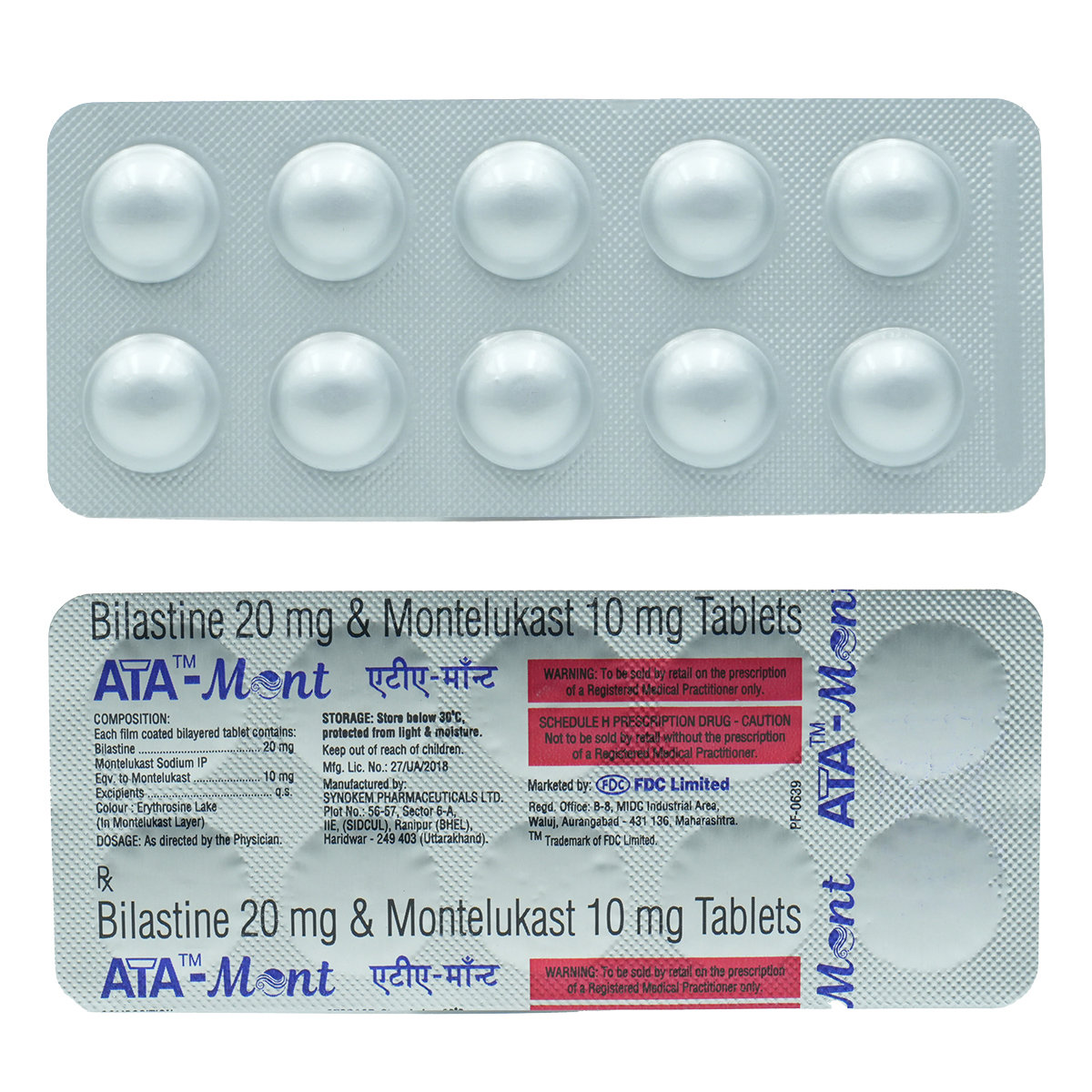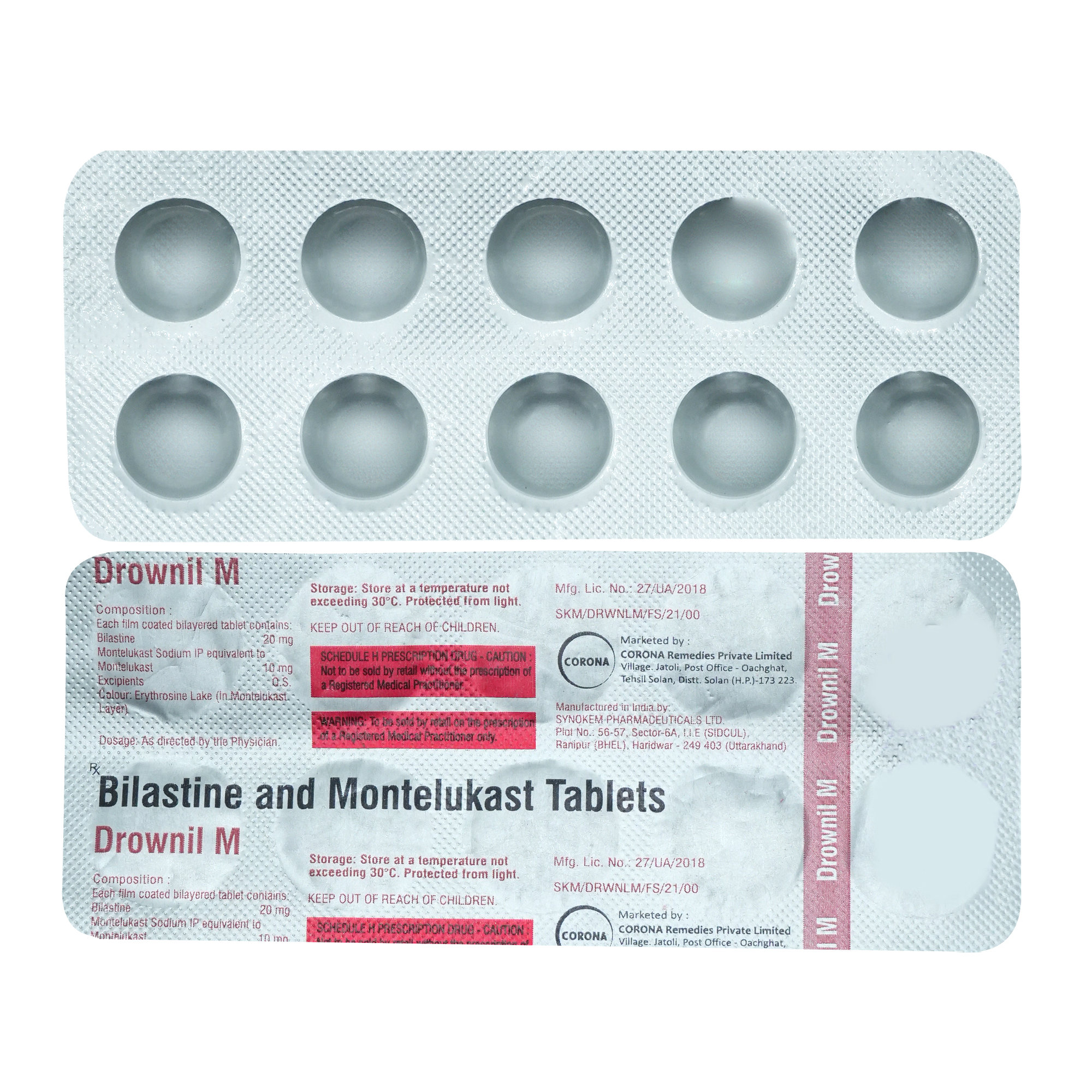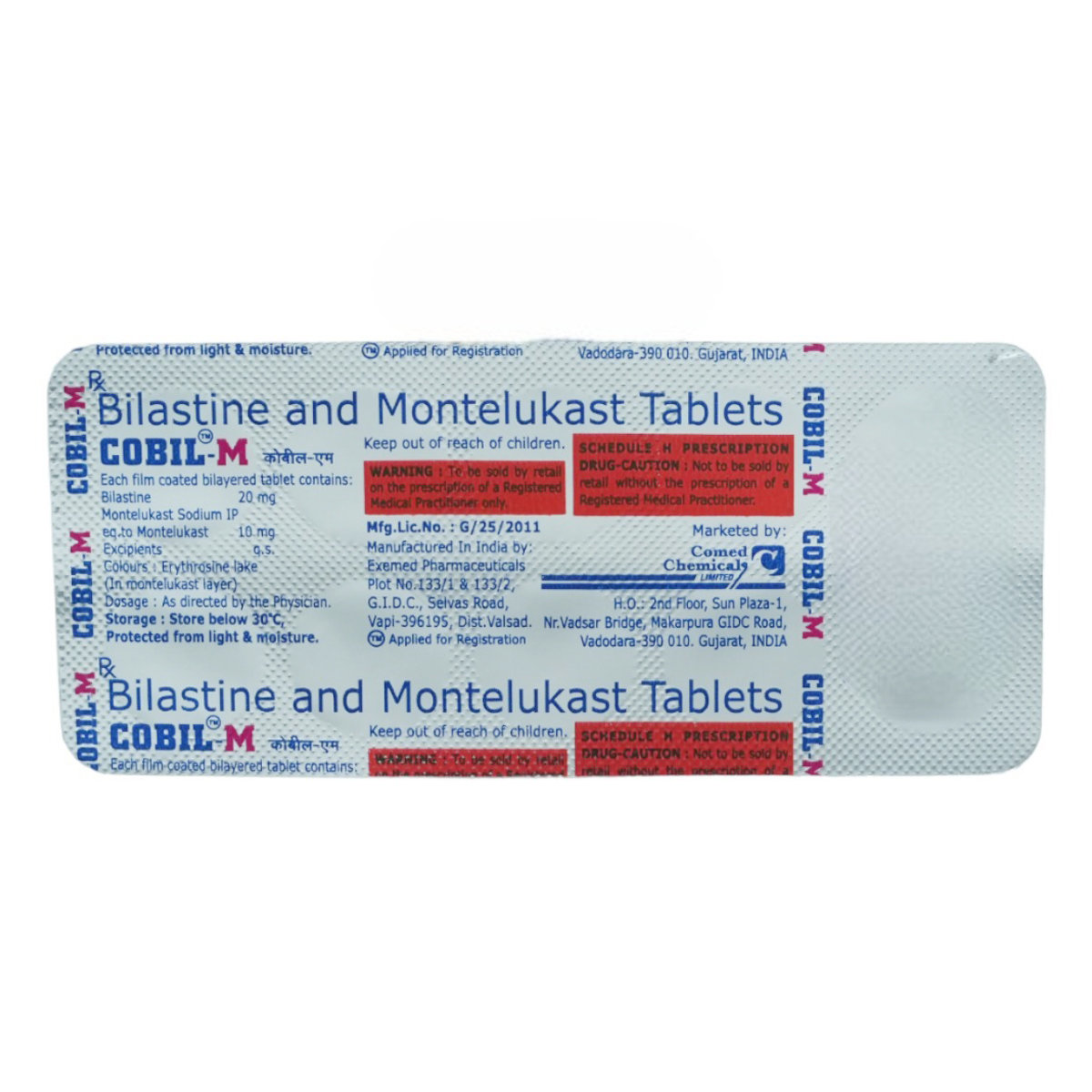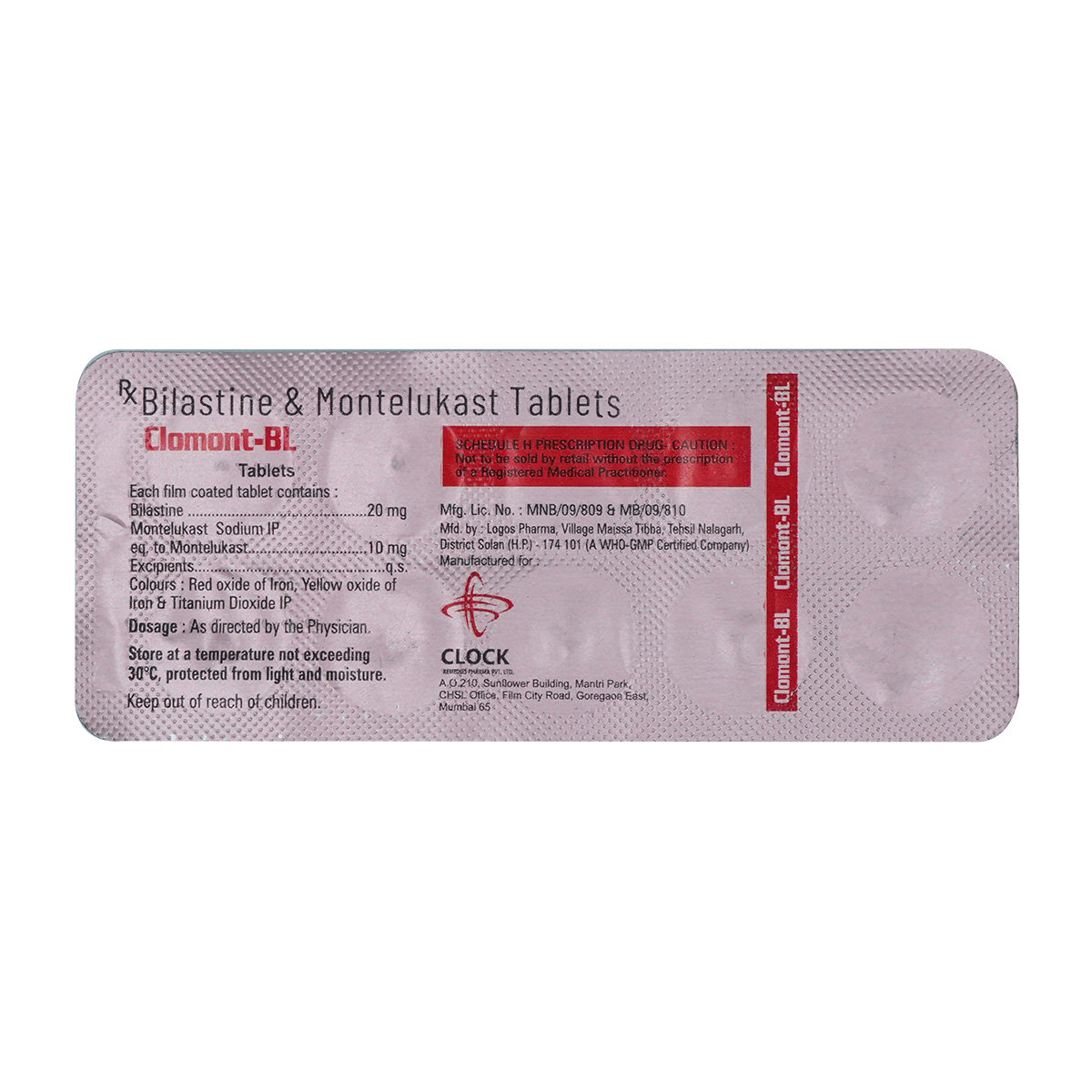Bilastine+montelukast
About Bilastine+montelukast
Bilastine+montelukast belongs to a class of medication called 'anti-allergic medication, primarily used to treat allergic conditions like sneezing, runny nose, congestion, stuffy nose or watery eyes. An allergy is a condition that occurs when the immune system reacts to a foreign substance that is typically not harmful to your body. These foreign substances are known as 'allergens' Some might be allergic to certain foods and seasonal allergies like hay fever, pollen, or pet dander. One of the main symptoms of allergy is cough, which acts as a reflex action in the throat when mucus or foreign irritant enters the respiratory system.
Bilastine+montelukast combines two drugs: Montelukast (leukotriene receptor antagonist) and Bilastine (antihistamine). Montelukast belongs to the class of leukotriene receptor antagonists that block the action of chemicals called leukotrienes released from the lungs, causing inflammation (swelling) and increased mucus production in the airways. Thereby reducing inflammation, mucus production, and narrowing in the airways. Bilastine belongs to the class of antihistamines (anti-allergic drugs) that works by blocking the action of histamine, a substance responsible for causing allergic reactions. It helps relieve allergy symptoms such as sneezing, running nose, watery eyes, itching, swelling, congestion, or stiffness.
Your doctor will recommend how often you take Bilastine+montelukast based on your medical condition. Some people may experience nausea, vomiting, dryness in the mouth, diarrhoea, flu-like symptoms, sleepiness, dizziness, and weakness. Most of these side effects of Bilastine+montelukast do not require medical attention and gradually resolve over time. However, if the side effects persist or worsen, please consult your doctor.
Inform your doctor if you are allergic to Bilastine+montelukast or other medicines. If you are pregnant or breastfeeding, it is advised to inform your doctor before using Bilastine+montelukast. Bilastine+montelukast is not recommended for children below 12 years of age. If you notice mood changes causing depression, self-harming thoughts, or aggressive behaviour while on Bilastine+montelukast, please consult a doctor immediately. It is advised to maintain 2 hours gap between taking Bilastine+montelukast and indigestion remedies containing magnesium and aluminium, as taking these medicines simultaneously may reduce the absorption of Bilastine+montelukast. Bilastine+montelukast is not recommended for people with impaired kidney or liver functions.
Uses of Bilastine+montelukast
Medicinal Benefits
Bilastine+montelukast is a combination of two drugs, namely Montelukast and Bilastine. Montelukast is a leukotriene receptor antagonist that blocks the action of chemicals called leukotrienes released from the lungs, causing inflammation (swelling) and increased mucus production and airways. Thereby reducing inflammation, mucus production, and narrowing in the airways. Bilastine is an antihistamine (anti-allergic drug) that blocks the action of histamine, a substance responsible for causing allergic reactions. It helps relieve allergy symptoms such as sneezing, running nose, watery eyes, itching, swelling, congestion, or stiffness.
Directions for Use
Storage
Side Effects of Bilastine+montelukast
- Rhinitis
- Headache
- Eczema
- Urticaria
- Abdominal pain/Upper abdominal pain
Drug Warnings
Inform your doctor if you are allergic to Bilastine+montelukast or any other medicines. If you are pregnant or breastfeeding, it is advised to inform your doctor before using the Bilastine+montelukast. Bilastine+montelukast is not recommended for children below 12 years of age. If you notice mood changes causing depression, self-harming thoughts, or aggressive behaviour while on Bilastine+montelukast, please consult a doctor immediately. It is advised to maintain 2 hours gap between taking Bilastine+montelukast, and indigestion remedies containing magnesium and aluminium as taking these medicines simultaneously may reduce the absorption of Bilastine+montelukast. Bilastine+montelukast is not recommended for people with impaired kidney or liver functions.
Drug Interactions
Drug-Drug Interactions: Bilastine+montelukast may interact with drugs used to treat high lipid levels (e.g. gemfibrozil), antibiotics (erythromycin), anticonvulsants (e.g. phenytoin, phenobarbital), antifungals (ketoconazole), and tuberculosis medications (rifampicin).
Drug-Food Interactions: Avoid consuming certain fruit juices such as orange, apple, and grapefruit with Bilastine+montelukast as it may reduce the effectiveness of Bilastine+montelukast. Also, avoid intake of alcohol with Bilastine+montelukast as it may increase drowsiness.
Drug-Disease Interactions: If you have mental illness or psychosis, kidney, liver, or heart problems, inform your doctor before taking Bilastine+montelukast.
Drug-Drug Interactions Checker List:
Safety Advice

Alcohol
cautionAvoid drinking alcohol while taking this medicine as it can worsen your side effects like drowsiness.

Pregnancy
cautionThe safety of Bilastine+montelukast in pregnant women is unknown. Therefore, it is given to pregnant women only if the doctor thinks the benefits outweigh the risks.

Breast Feeding
cautionIt is unknown whether Bilastine+montelukast is excreted in human milk. It is given to breastfeeding mothers only if the doctor thinks benefits are greater than risks.

Driving
cautionAvoid doing any work that needs complete attention, including driving, as this drug may make a person drowsy.

Liver
cautionTake Bilastine+montelukast with caution, especially if you have a history of Liver diseases/conditions. The dose may be adjusted by your doctor as required.

Kidney
cautionTake Bilastine+montelukast with caution, especially if you have a history of Kidney diseases/conditions. The dose may be adjusted by your doctor as required.

Children
unsafeBilastine+montelukast is not recommended for children below 12 years as the safety and effectiveness were not established.
Habit Forming
Diet & Lifestyle Advise
- Staying hydrated is vital for those with a cough or cold. Drink liquids at room temperature to relieve a runny nose, cough, and sneezing.
- The immune system is affected by stress and raises the risk of being sick. Do meditation, deep breathing, regular exercise, and try progressive muscle relaxation techniques to relieve stress.
- It is advised to avoid contact with known allergens (allergy-causing agents) such as pollen, dust, etc. Certain food items are known to cause allergies to you.
- Add ginger to foods or tea as it contains some anti-inflammatory compounds that can relax membranes in the airways and reduce cough, irritation, and swelling in nasal passages.
- Maintain personal hygiene and keep your surroundings clean.
- Eat a healthy diet and exercise regularly to strengthen your breathing muscles and boost your immune system.
- Learning breathing exercises will help you move more air in and out of your lungs.
- Quit smoking and avoid passive smoking. Smoking also reduces the effectiveness of the medicine.
Patients Concern
Disease/Condition Glossary
Allergies: Allergies or Allergic rhinitis is a natural response of the immune system against a substance called an allergen. Hypersensitive responses can happen with anyone, regardless of whether they have not had sensitivities previously. There is a possibility that a person may build up a sensitivity after coming in contact with an allergen more than once. Mild allergy symptoms include wheezing, a runny or blocked nose, swollen, watery eyes, or skin itching. Serious signs of an allergy are difficulty breathing, a rash, or hives. Hypersensitivity is an unexpected response that sometimes turns into a dangerous response and needs quick treatment.
FAQs
Bilastine+montelukast combines two drugs: Montelukast (leukotriene receptor antagonist) and Bilastine (antihistamine). Montelukast blocks the action of chemicals called leukotrienes released from the lungs, causing inflammation (swelling) and increased mucus production in the airways. Thereby reducing inflammation, mucus production, and narrowing in the airways. Bilastine works by blocking the action of histamine, a substance responsible for causing allergic reactions. It helps relieve allergy symptoms such as sneezing, running nose, watery eyes, itching, swelling, congestion, or stiffness.
You should avoid taking fruit juices like orange, apple or grapefruit with Bilastine+montelukast as they may reduce the effectiveness of Bilastine+montelukast.
Yes, Bilastine+montelukast may cause drowsiness. It is not necessary for everyone taking Bilastine+montelukast to experience this side effect. Therefore, avoid driving if you feel drowsy or dizzy after taking Bilastine+montelukast.
No, you are not recommended to consume alcohol with Bilastine+montelukast as it may increase drowsiness. However, please consult a doctor before consuming alcohol with Bilastine+montelukast.
Therapy with leukotriene receptor antagonists like Montelukast may worsen the symptoms of psychotic events in patients with a history of mental illness. Careful administration and monitoring are essential before taking Bilastine+montelukast in patients with neuropsychiatric disorders. Please consult your doctor before taking Bilastine+montelukast if you have been diagnosed or have a history of mental illness like depression, seizures (fits) etc.
Stopping Bilastine+montelukast without consulting with a doctor may cause drug withdrawal symptoms that can worsen allergies. It is better to ask the doctor even if you are feeling better, as sometimes the doctor prefers to lower the strength of the drug.






